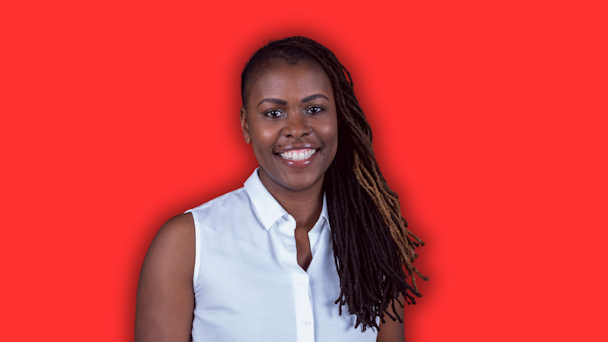How WPP is advancing its Racial Equity Program by treating it as an ESG goal
We meet the global director of WPP’s $30m Racial Equity Program and judge of The Drum Awards for Social Purpose, Dr Stacie CC Graham.

Dr Stacie Graham will be judging The Drum Awards for Social Purpose
We all remember 2020, though most of us would rather forget. From the confines of lockdown due to the Covid-19 pandemic, people worldwide watched as a Black man was murdered in police custody and as the subsequent wave of Black Lives Matter protests swept the globe.
Dr Stacie CC Graham wasn’t at WPP at the time, but as she tells The Drum, its senior executives made the call that they needed to commit more to anti-racism initiatives. Graham was subsequently appointed global director of the holding company’s Racial Equity Program, where she says she has “the privilege of leading that $30m commitment.”
Initially, Graham says the restrictions of lockdown actually worked in her favor. “I was able to get in people’s diaries remotely in a way that would never happen today.” Connecting with leaders across WPP’s vast network, from India to Japan to Australia, Graham says she was able to create a framework for the Racial Equity Program that would “help to transform the industry from the inside.”
There are three parts to the program. “The first is the internal work,” Graham explains. “What WPP needs to do in terms of recruitment, retention, advancement and so forth. But that’s not really my area."
“My area is: how do we transform the industry through what the production sets look like? In front of, and behind, the camera. Then, more broadly, how do we move clients in the right direction? Though, to be honest, clients are putting more pressure on agencies rather than the other way around.”
She says one of the biggest challenges is that racial equity is not a monolith. “When people internally and externally hear we were founded in the wake of Black Lives Matter, they tell me that this isn’t an issue in their country. But we say racial equity refers to all people who are racially and ethnically marginalized – those categories shift across cultures.”
She uses Brazil as an example. “Brazil has the largest population of people of African descent outside of Africa. 56% of the population identifies as Black. When you consider the Indigenous population, it becomes more like 58% or 59%.”
She explains that Brazil has progressive legislation on how to utilize things like positive discrimination. “But we don’t see that reflected in agencies. Similarly, in South Africa, 80% of the population is Black, but you don’t see it reflected in agencies.”
Her mission has been further frustrated by the socio-economic fallout of the pandemic and the need to simultaneously address issues like the recession, cost of living crisis and the ongoing climate emergency.
With all these issues demanding investment from WPP, her approach has been to align how they are viewed and discussed by senior leaders.
“I try to frame things through an ESG perspective rather than race alone and siloed,” she explains. “Everyone’s pretty comfortable with the 'E' [environmental] these days but it took a while to get there.”
From there, she can broaden the discussion to the relationship between race and climate change, for example. “In the US, if you look at the cities most susceptible to things like flooding from climate change, they are predominantly Black and brown spaces. New Orleans is going to be underwater, and Miami [where Graham is from originally] is going to be underwater. California, one of the most diverse states, is threatened by droughts and wildfires.”
When we look at the global south, Graham also notes that leaders there have been ringing the alarm bells on climate change for some time without garnering recognition. A key way to address this, she says, is to figure out a way to talk about climate change through the lens of who will be most affected by it. Though she admits: “We're not there yet.”
Despite the scale of the issues we still face, Graham believes that we’re getting better at talking about other marginalized identities, like gender, sexuality and disability. Yet, she says not long after the widespread social reckoning with racism we experienced in 2020, colleagues and peers were dismissive of the need for further progress. “People would say “well, haven’t we it done it now?””
She says it’s because there’s still a level of discomfort that arises when talking about race, that doesn’t crop up in other discussions – largely due to a lack of depth of historical knowledge. One way to combat this is through an emphasis on culture.
Recently, while engaging creative directors on the framework, Graham says she looked at the relationship between culture, race and hip-hop. “We all know that hip hop is music, but it’s also graffiti, dance, so many things. We can have negative associations, too.”
She says this is one of the things she’s most proud of in her time in the role – breaking down the tension in the things we don’t want to discuss. "That might be one of our lasting legacies. Helping to break down those pillars and helping people address those inner conflicts.”
It might be rewarding work, but Graham still takes the time to implement the self-care required to do it to the highest standard. She’s a yoga and mindfulness teacher, a practice she says is “also steeped in anti-oppression” and is disciplined about her routines. “My do not disturb goes on at 9pm, and it doesn’t come off until 9am,” she laughs. “But I think the main thing is, I’m true to my practice, and I get so excited by it.”
The Drum’s annual Awards Festival will take place in December when we celebrate creative brilliance across categories such as advertising, PR, content and digital. The deadline to enter is 6 September.

